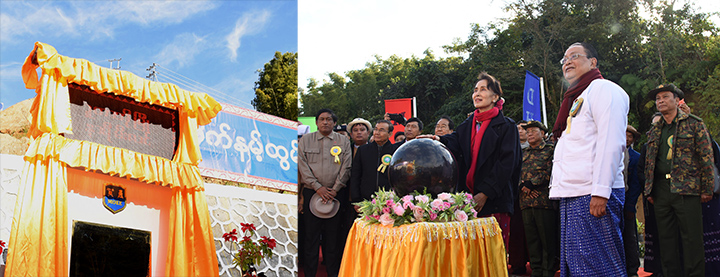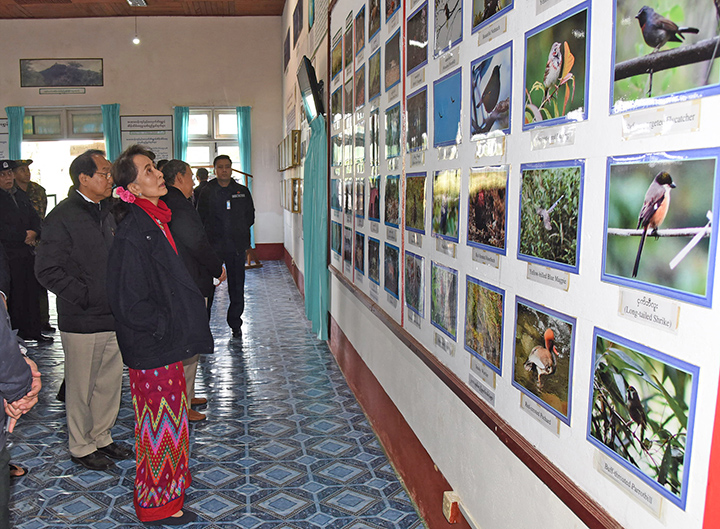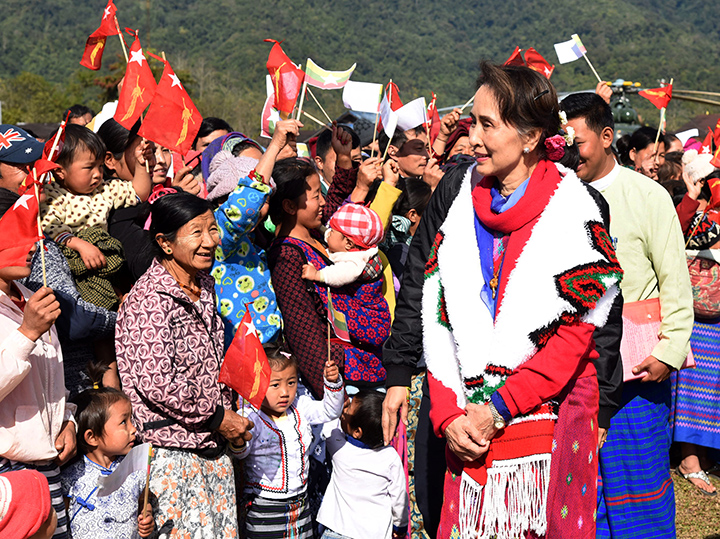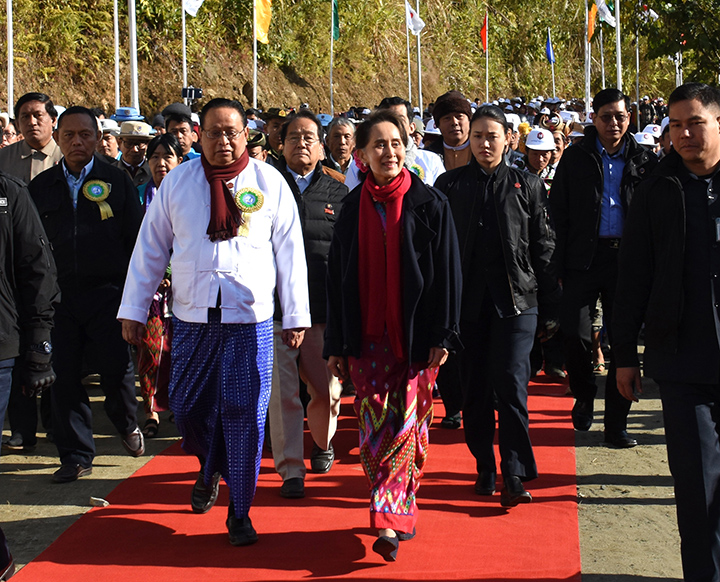10 January
State Counsellor Daw Aung San Suu Kyi, Chairperson of the Central Committee for Development of Border Areas and National Races, attended a ceremony to open the Upper Namhtwan Hydro Power Plant in Putao, Kachin State yesterday.
At the ceremony, State Counsellor Daw Aung San Suu Kyi unveiled the inscription of the hydropower project which is equipped with 3.2 MW to produce 14.3 million kilowatt hours per year and will supply 10 wards in Putao, four wards in Machanbaw and 23 villages around the clock.
“Roads and infrastructure are important for connecting all of us and for developing our economy. As I mentioned just now, achieving electrification will not just develop our lives, but also open the path to better opportunities for generations to come,” said State Counsellor Daw Aung San Suu Kyi in her opening speech.
“Now that I’m here in Putao, I have seen many different ethnic races living here and this has strengthened the Union spirit deep in my heart. We have to stand together true to this spirit. We are not a powerful or rich country. Not yet. But our country will one day become prosperous and powerful thanks to the efforts of the people and the children of the nation. We will stand with courage and faith at the center stage of the world. Achieving electrification supports communication efforts within the country and with the whole world,”she added.
“While this power plant is not large by global standards, it is quite important for our country because it is in a central location. With Putao being in the northern and highland region, establishing an electric power plant here highlights the technological advancement of the country. It also shows everyone the cetana (goodwill) and care we have for all ethnic nationals of the Union,” said the State Counsellor.

“It’s a joyous occasion to be able to open a power plant, even more so for me to be here in person. I am especially pleased to meet with the local residents here. The entire country is working to achieve full electrification. To explain the reason behind this monumental task in a few short words, it is to bring light into the lives of our citizens and the sons and daughters of our Union. By this, I don’t mean just the light of electricity, but the light of future opportunities brought by the achievement of electrification.”
“Having access to electricity will light up the lives of both children and their parents. It will be a guide for their future. There will also be more opportunities for businesses to grow. We are not trying to achieve electrification with a simple-minded approach; we are proceeding with the open-minded view to achieve benefits for our nation.”
“I saw the icy mountain quite clearly on my way here. It wouldn’t be visible if a fog or the rains were present, or if it were dark. We could only see it clearly if there is light and we can gaze at its beauty and wonder about its composition. People living in the highlands are some of the sturdiest people in the world. They are robust, courageous and live in harsh surroundings.”
“There is a poem written by people far away from our country. The poem says by looking at the mountains, one can receive courage, hope for the future, strength to lead, trust and faith. The poem points out to the mental benefits gained from mountains. But we cannot solely rely on mental benefits. We need support from our physical aspects too. We are prioritizing building roads and electrification for our people from the highlands so that their physical wellbeing can develop on par with their mental aspects of courage, trust and faith.”
“We need to be able to see cetana for what it is. No matter how much goodwill we have in our hearts, if it cannot be seen or acknowledged then it will not be as beneficial as we intend it to be. Only when the goodwill is apparent will a close bond form between the giver and the receiver. I want everyone to know that the Union government places cetana and loving-kindness on all the people and children of our Union. I don’t say this to take pride for ourselves. I mean to strengthen the existing relations between us all. No matter how big or small a project is, the main drive behind it is cetana and correct conduct.”
“I trust that the Ministry for Electricity and Energy confidently fulfill their duties and responsibilities. I want to say something for the workers here. I understand your difficulties and hard work in carrying out your duties in regions such as this one. We value your commitment and ask you to take pride in yourselves for this. Not everyone receives this kind of opportunity to perform important work for the country. Your work enables all ethnic nationals to bond closer and strengthen their loving-kindness with one another.”

“This is why I want every worker to take pride in what they are doing and what they have done here. Please, firmly place it in your memory that you have personally done something for your country and national development. It is important during your time working here to get to understand the needs, worries and hopes of the local residents so that you can disseminate the Union spirit among them. This is the duty of all civil servants, who are in a way staff of Kachin State, and Nay Pyi Taw. You cannot discriminate. You cannot have the mentality of just being staff of Nay Pyi Taw or the local area.”
“All of you are staff of the entire nation. Each and every one of you have to be loyal to the whole Union, and share responsibility towards it. From the common workers and civil servants working on transportation in Putao to the project workers and staff, every one of you is important.”
“Every citizen is valuable to the nation. That is why I want to impart some words to the children of our Union while I am here. We are all truly living on one land and drinking from the same water. A place like Kachin State and Yangon Region in the south are different, but we are taking the same path into the future. Everyone in the country is on this same path. I want the path we all take to be well lit, both from the electric lighting and our spirits.”
“I want our hopes to be big enough to light our way too. Everyone shares this responsibility and the opportunities that come with it. If you use your opportunities correctly then you can fulfill your responsibilities completely. That is why while we are here, I have come to better understand the hopes and challenges of our people.”
“We came here to find out the difficulties and hopes of the people here. It is the duty of those carrying the responsibility of government to discover methods to remove challenges and realize the hopes of the people. As I’ve mentioned before, carrying out the duty of the government falls on the shoulders of the President, down to the most junior civil servant.”
“We are all working towards the development of the nation, its future, security, and stability. I want all our citizens to build trust, feel reassured, and build bonds akin to close siblings when interacting with civil servants. This duty lies on civil servants too.”
“We do not work as civil servants to become rich. You go into business for that. That’s why it is not suitable for people to come into government positions to attain wealth. I mention this because our citizens do not have 100 per cent faith in the civil servants yet. We have to strive for 100 per cent. When the people have complete trust in the civil servants then our country can truly be called a developed country. Some people calculate the development of a nation by looking at its financial situation and per capita income; they try to find if a nation is rich or poor. But we cannot calculate in the same way. We need to see how united a country is first. That is why I take every opportunity I get to urge all of you to seize the opportunities for achieving unity.”
“I want to urge all of the citizens, sons and daughter of this country to do so. And I also urge the civil servants of this great nation, who are born from the same place as its citizens. On this day we have achieved electrification, and on similar days, I kindly request all of you to use the opportunity present before you to bring in more light into the lives of all the people in the country. And with that I conclude my speech. Thank you.”

The ceremony was formally opened by Union Minister for Electricity and Energy U Win Khaing, Chief Minister of Kachin State Dr. Khet Aung, Chairman of Electricity Development Committee U Kyi Moe Naing, members of the Kachin State cabinet U Win Nyunt and U Wai Lin, Deputy Speaker of Kachin State Hluttaw U Khan Lin and officials.
The State Counsellor visited the plant and viewed the electricity generation process.
Following the ceremony, State Counsellor Daw Aung San Suu Kyi visited the Khakaborazi National Park’s Environmental Conservation Booth where Union Minister for Natural Resources and Environmental Conservation U Ohn Win, Director-General of the Forest Department Dr. Nyi Nyi Kyaw and Administrator of the Khakaborazi National Garden U Aung Maung reported on conservation efforts.
The Khakaborazi National Park was established on 10 November, 1998, on 1,472 square acres. It was included in the list of ASEAN heritage on 18 December, 2003.
The Phonkanrazi Wildlife Sanctuary was established on 1 December 2003, on 1,044 square acres. It is a home for 36 species of mammals, 370 bird species, 360 butterflies and 82 species of reptile and amphibians.
Afterwards, the State Counsellor visited the Yawen National Park and visited the Yawen National Museum.
Afterwards, State Counsellor Daw Aung San Suu Kyi and her entourage flew to Nagmon frontier camp of the Khakaborazi National Park.
At the camp, Deputy Director of the Forest Department Dr. Naing Zaw Tun reported on measures being taken for nominating the Phonkanrazi Wildlife Sanctuary for World Heritage List, condition for research works, prospects for nature-based tourism services and recreation.
Following the visit, State Counsellor DawAung San SuuKyi met with MPs, town elders and local people.
Speaking at the meeting, State Counsellor Daw Aung San Suu Kyi encouraged the local people saying that the region has prospects for development as it has valuable human and natural resources.
Myanmar lagged behind the development in comparison with neighboring countries and other ASEAN countries, but we can take lessons from their weaknesses when they were working for development, she said.
“Taking lessons from them, we can put our country on the right path to development. Just development is not enough. The right type of development is important,” said the State Counsellor, stressing the need to conserve the country’s natural resources and to pass it down to the next generation as a good heritage.
She also stressed the importance of good transportation access to be able to provide the people with educational opportunities so that they have mental and physical maturity.
The State Counsellor reiterated the basic five points presented by the people to be fulfilled, saying that health is the most important point in the five points which include drinking water, transportation, electrification and education.
She encouraged the local people in Nagmon not to feel inferior because they have a bright future as long as they are physically and mentally mature.
At the meeting, State Counsellor Daw Aung San Suu Kyi presented rice, cooking oil, salt, beans, dried fish, dried noodles, garlic and onions to the people.
Following the meeting, the State Counsellor flew to Putao by Tatmadaw helicopter.
From there, she left for Myitkyina by air.
At the Palm Spring Hotel, State Counsellor Daw Aung San Suu Kyi met with U Hson Dan Di Sarh and U Htalar Nam Sin of Maliikhun Village in Putao Township, U Hson Dam Yon San and U Htalar Nam Min of Layyinkwin Ward, Maung Zon Pali Phone Ze and Maung Hson Dam Aung Tan, Maung Ayom Dam Khin, Maung Hson Dam Sarh Yam and Ma Zonpali Nan Bay of Ayondam Village, Pannandin.
At the meeting, the State Counsellor heard the requirements of the ethnic people and pledged to fulfil their needs as soon as possible.—MNA
(Translated by Zaw Htet Oo)


